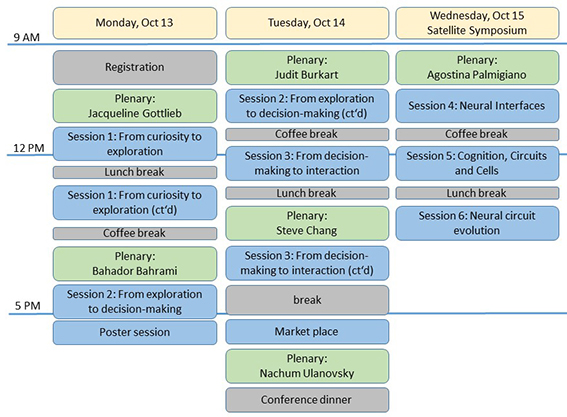Topics and Call for contributions
Main Symposium
We aim to bring together researchers from neuroscience, psychology, behavioral sciences, and computational disciplines working on attention, perception, motivation, learning, exploration and decision-making, with a particular focus on social contexts.
The main program is structured around three thematic sessions: From Curiosity to Exploration, From Exploration to Decision-Making, and From Decision-Making to Interaction. Together, these sessions trace a functional arc from internal motivational states to outward-directed behavior and social engagement. Contributions will address neural, cognitive, developmental, and behavioral mechanisms across species and across the lifespan, with a shared interest in how information seeking and adaptive behavior emerge and are regulated.
Across these sessions, possible topics include:
- Neural and motivational foundations of attention and curiosity
- Ontogeny, individual differences, and species-specific strategies of exploration
- Cognitive and neural mechanisms underlying planning and decision-making
- Social learning, partner choice, and interaction patterns in both typical and clinical populations
The main program concludes with an Interactive Methods Marketplace — an open format for live demonstrations of tools, experimental approaches, and workflows that foster reproducibility, interdisciplinary exchange, and innovation.
Satellite Symposium
The third conference day is dedicated to a satellite symposium organised by the Campus Institute for Dynamics of Biological Networks to celebrate the 20th Anniversary of the Bernstein Center of Computational Neuroscience Göttingen.
It lays the focus on the systems-level mechanisms and evolutionary foundations of cognition and behavior. The sessions Neural Interfaces, Cognition, Circuits, and Cells, and Neural Circuit Evolution explore how neural systems are organized, how they support flexible behavior, and how complex brains and minds have emerged over evolutionary time.
Possible topics across these sessions include:
- Brain-computer interfaces, neurofeedback, and AI-supported decoding
- Circuit dynamics and molecular mechanisms underlying learning and flexibility
- Evolutionary developments leading to complex neural architectures and cognition
We invite to contribute to the program with talks or posters. Submissions will be selected based on scientific quality and thematic relevance.
Tenative schedule

-
main Symposium
-
Session 1: From curiosity to exploration
S1 -
Session 2: From exploration to decision-making
S2 -
Session 3: from decision-making to interaction
S3 -
Poster session
P
-
-
Satellite Symposium
-
Session 4: Neural Interfaces
S4 -
Session 5: Cognition, Circuits and Cells
S5 -
Session 6: Neural circuit evolution
S6
-
